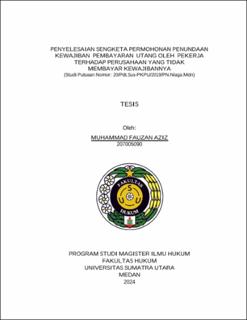| dc.contributor.advisor | Sunarmi | |
| dc.contributor.advisor | Siregar, Mahmul | |
| dc.contributor.advisor | Robert | |
| dc.contributor.author | Aziz, Muhammad Fauzan | |
| dc.date.accessioned | 2025-02-24T02:29:04Z | |
| dc.date.available | 2025-02-24T02:29:04Z | |
| dc.date.issued | 2024 | |
| dc.identifier.uri | https://repositori.usu.ac.id/handle/123456789/101597 | |
| dc.description.abstract | This research is motivated by the frequent occurrence of problems involving
workers who do not receive payment of normative rights such as wages and
severance pay that should be paid by the company. In some cases, workers face
difficulties in executing the Industrial Relations Court's decision regarding their
rights that are not paid by the company. In response to this obstacle, some workers
choose to file a request for Postponement of Debt Payment Obligations (PKPU) at
the Commercial Court as an alternative to ensure that workers' rights are fulfilled.
This study aims to determine and analyze the legal provisions for submitting a
request for postponement of debt payment obligations, to determine and analyze the
settlement of disputes in the Commercial Court between workers and companies that
do not fulfill their obligations to pay workers' normative rights and to determine and
analyze the analysis of Decision Number: 20 / Pdt.Sus-PKPU / 2019 / Pn.Niaga.Mdn
regarding the request for postponement of debt payment obligations submitted by
workers. The research method used in this study is a type of normative legal
research, which is supported by secondary data sources, and qualitative analysis is
carried out.
Law Number 37 of 2004 concerning Bankruptcy and PKPU provides a legal
mechanism for workers to claim their normative rights through a PKPU application
against a company that does not fulfill its obligations. The PKPU process in the
Commercial Court involves stages of debt verification, creditor meetings, and peace
efforts that can result in a settlement that benefits both parties. Decision Number
20/Pdt.Sus-PKPU/2019/PN.Niaga.Mdn proves the effectiveness of the PKPU
mechanism in resolving disputes between workers and companies, where a peace
agreement was reached that resulted in full payment of workers' rights. This shows
that PKPU can be a fair and efficient solution in guaranteeing workers' rights while providing an opportunity for companies to fulfill their obligations and continue their
business. | en_US |
| dc.language.iso | id | en_US |
| dc.publisher | Universitas Sumatera Utara | en_US |
| dc.subject | Dispute Resolution | en_US |
| dc.subject | PKPU Applications | en_US |
| dc.subject | Workers | en_US |
| dc.subject | Companies | en_US |
| dc.title | Penyelesaian Sengketa Permohonan Penundaan Kewajiban Pembayaran Utang oleh Pekerja terhadap Perusahaan Yang Tidak Membayar Kewajibannya (Studi Putusan Nomor: 20/Pdt.Sus PKPU/2019/PN.Niaga.Mdn) | en_US |
| dc.title.alternative | Dispute Resolution Application for Postponement of Debt Payment Obligations by Employees Against The Company Who Does Not Pay Their Obligations | en_US |
| dc.type | Thesis | en_US |
| dc.identifier.nim | NIM207005090 | |
| dc.identifier.nidn | NIDN0015026304 | |
| dc.identifier.nidn | NIDN0020027303 | |
| dc.identifier.nidn | NIDN0020027303 | |
| dc.identifier.kodeprodi | KODEPRODI74101#Ilmu Hukum | |
| dc.description.pages | 179 Pages | en_US |
| dc.description.type | Tesis Magister | en_US |
| dc.subject.sdgs | SDGs 16. Peace, Justice And Strong Institutions | en_US |


